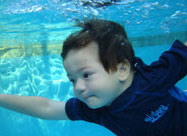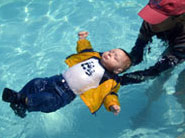 |
|||
 |
FAQs
Will my child cry during lessons?The first few weeks in lessons for a beginner are a critical time of adaptation to the new environment, the instructor, and the technique. It can be a time of apprehension in and around the water because your child has not had time to perfect his or her new skills. Some of the babies cry because crying is a form of infant communication. There are several different types of infant cries and it is important to be sensitive and educated as to what these different types of cries indicate. Each child is an individual and reacts to the lessons uniquely. Some never cry and most children stop crying when they become skilled in the water. It is very important that the parent sets the example by keeping a positive tone when at lessons and when discussing lessons with or around the child. How do you teach a baby to swim?ISR instructors teach infants to swim by honoring each child's individual strengths and experiences. They understand the fundamentals of the behavioral sciences, child development and of sensorimotor learning as it relates to the acquisition of aquatic survival skills; they use this education to guide each child through the sequence of learning to swim and float. Will my child be drown-proof?No, nobody can ever drown-proof your child. Be leery of any program that advertises they can. Why don’t you allow the parents to be in the water during the lessons?We do not want the baby to initially associate the water with the love, attention and affection of the parent with the water. Also, it takes incredible concentration and objectivity to teach the baby how to react to an aquatic emergency and our research shows that parents lack the objectivity to be effective teachers with their own children in the water. Will my child learn to fear the water?It is important that the child not fear the water because being fearful would make it more difficult for the child to learn the necessary skills. There is an important difference between being fearful and being apprehensive because you are not yet skilled in a dangerous environment. How are the ISR Instructors trained?ISR Instructors are the most highly trained and qualified instructors in any swimming program in the country and must undergo strict re-certification testing annually. Each instructor is academically trained and tested in areas such as child development and learning theory, behavioral science, anatomy, physiology and physics as they relate to infants and young children in the aquatic environment to provide the safest lesson possible for your child. In addition, each instructor spends a minimum of 60 hours of hands-on, supervised, in-water training working with actual students. They are all also CPR and First Aid Certified. 
Why don't you teach infants under the age of 6 months?Children under the age of 6 months are not neurologically mature enough to benefit from ISR instruction. Why are Refresher lessons necessary?After their initial training, it is recommended that each child participate in Refresher lessons each season. Refresher lessons are important because children change so much both cognitively and physically during the first 2-3 years of life. It is important that their aquatic skills and abilities grow with them. How do the babies and children know to hold their breath?Breath holding skills are taught in the first lesson. We shape breath control using highly effective positive reinforcement techniques. What about floatation devices and life jackets?Flotation devices give children a false sense of security and hold them in postures that are not compatible with swimming skills. If a child learns that he can jump in the water and go into a vertical posture and he will be able to breathe, he is getting the wrong idea about that environment. Flotation devices are for children who cannot swim. Children, who cannot swim, should not be allowed to learn that it is safe to play in the water while relying on a crutch. Life jackets must be worn in a boat or around the water when there is the potential for an accidental submersion. They are not a substitute for the ability to swim or for adult supervision. How do babies know how to respond to a fall-in?A baby does not need to perceive danger or be afraid to respond appropriately to being underwater. If a baby has learned to roll over and float when he needs air, he does not need to perceive danger in order to respond in this manner. He needs skill, practice and confidence to calmly deal with the situation. 
Who invented this method and how long has it been practiced?Dr. Harvey Barnett, who holds a PhD. in Psychological Foundations from the University of Florida researched and developed this program over a period of more than 39 years. For more information about ISR’s history, visit our national website at www.infantswim.com. Why do you not want your students to eat for at least 2 hours prior to lessons?The lessons require a lot of physical activity for the students. We do not want them to eat prior to lessons because we want them to be as comfortable as possible. For more information contact us today! |
||





